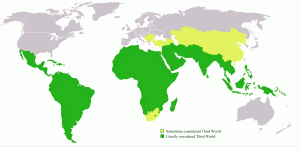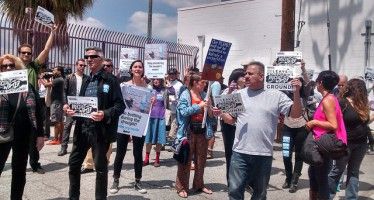It’s official: California now a Third World republic
By John Seiler
“About a quarter-century ago, I wrote a book about California’s social, economic, demographic and political evolution and quoted a couple of academics as predicting ‘the possible emerging of a two-tier economy.’
“Today, we can eliminate the ‘possible’ qualifier because it’s a proven fact.
“A Census Bureau poverty report and another from the Center on Budget and Policy Priorities,released simultaneously last week, should remove any lingering doubt about California’s stratification.
“The Census Bureau is experimenting with a new way of gauging poverty, one that uses more measures of income and outgo and the cost of living. And by that new standard, California has — by a wide margin — the highest level of poverty of any state, with nearly a quarter of its 38 million residents in that category.
“Meanwhile, the CBPP calculated, state by state, gaps in various family income brackets and found that California has the third largest ‘income inequality‘ between those in the highest and lowest levels, and the second largest between those in the highest and middle quintiles.”
That shows how prescient has been Walters, the dean of California reporters. Since I came to California 25 years ago, I’ve learned more about the state from him than anybody.
As Aristotle was the first to write, the key to liberty is a large middle class. That’s because only if the vast majority of people are financially able to take some time off to participate in politics can you have the discussions necessary to ensure and advance freedom.
If a society has a large number of poor people, such folks are too busy scraping together the means to survive to engage in politics adequately, meaning not just vote, but take the time to learn such things as the evils of socialism and the high taxes needed to pay for it. Such is the very definition of what we now call a “Third World” country — which definition now fits California. Wikipedia’s map of the Third World, posted above (click to enlarge), should be changed to include California.
Explanations
Walters’ explanation:
“The decline of a once-vigorous industrial economy wiped out countless well-paying, middle-class jobs. The emergence of a post-industrial economy rooted in trade, services and technology marginalized those without the specific talents and training the new economy demanded.
“Public policy did not adjust to that new economic reality, nor to the rapid ethnic diversification of the state’s population.
“In particular, public education failed to adjust — in part because school finance and governance shifted from local hands to state politicians and bureaucrats and became politically polarized. The very wide disparities in educational outcomes, from test scores to dropout rates, between white and Asian students on one end and black and Latino kids on the other attest to that failure.”
That’s pretty good. Here’s my explanation:
1. The California Coastal Commission, imposed in 1972 by voters most of whom now are dead, severely restricted housing construction in coastal areas. Other anti-housing measures were added, such as SB 375 in 2008, sponsored by Senate President Pro Tem Darrell Steinberg, D-Sacramento, and signed into law by Republican anti-California obsessive Gov. Arnold Schwarzenegger, further restricted the housing supply. California also has a very high divorce rate, leading to two households instead of one, which increases demand for housing and thus the price of housing.
The result is housing prices more than twice that of the rest of the country. Along with other high expenses (see below), you have to make about twice what you do in the rest of the country just to stay in the middle class.
2. You’re forced to pay sky-high taxes that just went higher. Forget the rich, who just got their taxes jacked up by Proposition 30, passed by another generation of misguided voters. Prop. 30 also increases sales taxes, already the highest in the country, grabbing another $1 billion a year, mainly from the middle class.
The top middle-class tax rate, 9.3 percent, also kicks in at around $48,000 of income, by far the highest of any state. California is the only state whose income tax is both “progressive” (aimed at the rich), because the top rate now is 13.3 percent, and “regressive” (aimed at the middle class) because of that 9.3 percent kicking in at $48,000. Indeed, $48,000 puts you in the lower-middle class. You can’t even raise a family on that in California (although you could in low-cost Michigan or Arkansas).
3. The crummy K-12 government school system means you need to pay for tutors or private-school tuition. That means you have to make even more money — which is taxed at the 9.3 percent rate!
4. Anti-jobs legislation, such as Arnold’s and Gov. Jerry Brown’s beloved AB 32, have killed hundreds of thousands of high-paying, middle-class jobs in industry.
5. The government-worker unions run roughshod over the state, totally dominating everything, as the recent election showed. With the Democratic supermajority now in both houses of the Legislature, the unions will be demanding payback, raising taxes and imposing regulations at will. With union power so great, the only people thriving in California are: Silicon Valley billionaires with 180-plus IQs, Hollywood moguls and stars, drug dealers and government workers.
6. As Walters notes, California now is a heavily Blue state, meaning (my interpretation) its political culture is pro-government, pro-tax, anti-business, anti-jobs, anti-middle class.
7. There’s one “good” development. The continued exodus of productive people from California will cause another housing crash when the next recession hits, likely some time next year. Then those who haven’t fled will have a slightly better chance of moving up into the middle class.
Related Articles
Biden due in L.A. to tout minimum-wage hike — commuters, beware
Monday, Joe Biden was in Nevada touting a hike in the minimum wage as the key to fighting income inequality.
Protests erupt at Nestlé bottling plants in Sacramento and L.A.
Earlier this week, local California activists and concerned residents led protests against Nestlé at bottling plants located in Los Angeles and Sacramento.
Harkey has long history of whining — about coverage, questions and more
The coverage of Assemblywoman Diane Harkey, R-Dana Point, and her $10 million lawsuit against Sen. Mark Wyland, R-Solana Beach, over





